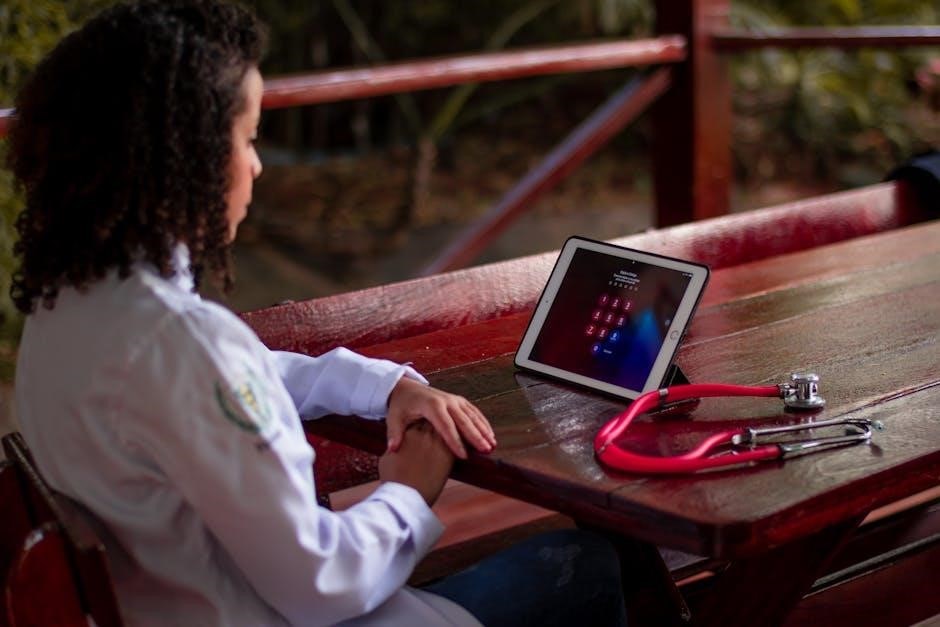Advanced pathophysiology is the study of abnormal changes in the body, essential for nurse practitioners to understand disease mechanisms and improve diagnostic and treatment strategies.
It serves as a foundational course, blending scientific knowledge with clinical expertise to enhance patient care outcomes and decision-making skills for advanced practice nurses.
This section provides an overview of key concepts, emphasizing the integration of genetics, inflammation, and cellular responses to guide evidence-based practice in diverse healthcare settings.
Importance of Pathophysiology in Nursing Practice
Pathophysiology is a cornerstone of advanced nursing practice, enabling nurse practitioners to understand the underlying mechanisms of diseases. This knowledge allows for accurate diagnoses, tailored interventions, and improved patient outcomes. By bridging the gap between scientific theory and clinical practice, pathophysiology empowers NPs to deliver evidence-based care. It enhances their ability to interpret symptoms, identify risk factors, and develop personalized treatment plans. Understanding disease processes at a cellular and systemic level is critical for addressing complex patient needs and staying ahead of emerging therapies.
Foundational Concepts of Advanced Pathophysiology
Advanced pathophysiology explores genetic, cellular, and systemic mechanisms of disease, emphasizing inflammation, immune responses, and adaptive changes. These concepts are vital for understanding complex disease processes and guiding clinical decision-making in nursing practice.
Genetics and Genetic Diseases
Genetics plays a pivotal role in understanding disease mechanisms, as heritable mutations and chromosomal abnormalities can predispose individuals to specific disorders. Nurse practitioners must grasp how genetic variations, such as single nucleotide polymorphisms or chromosomal deletions, influence disease manifestation. This knowledge aids in identifying high-risk patients and tailoring interventions. For instance, mutations in BRCA1/2 genes are linked to breast and ovarian cancers, while cystic fibrosis results from CFTR gene mutations. Understanding genomic data enables nurse practitioners to integrate personalized care strategies, improving outcomes for patients with genetic predispositions or inherited conditions. This expertise is critical in modern, evidence-based nursing practice.
Inflammation and Infection Processes
Inflammation is the body’s protective response to injury or pathogens, involving immune cells and cytokines. Acute inflammation resolves quickly, while chronic inflammation persists, contributing to conditions like arthritis and diabetes. Understanding these processes is vital for nurse practitioners to manage infections and inflammatory diseases effectively. Genetic predispositions can influence inflammatory responses, and therapies often target specific pathways to reduce tissue damage. Advanced practice nurses must recognize the interplay between inflammation and infection to develop tailored interventions, enhancing patient outcomes and reducing complications in diverse clinical settings.
Cellular Responses and Adaptations
Cellular responses and adaptations are critical mechanisms by which the body maintains homeostasis in the face of injury or disease. These processes include signaling pathways, cytokine production, and structural changes that enable cells to survive stress. Adaptive responses such as hypertrophy, atrophy, and hyperplasia allow tissues to compensate for altered demands. Understanding these cellular mechanisms is essential for nurse practitioners to identify early signs of dysfunction and implement targeted therapies. Advanced practice nurses must recognize how genetic and environmental factors influence cellular adaptations, ultimately guiding personalized care strategies to improve patient outcomes and reduce complications in diverse clinical scenarios.

Integration of Genetics and Genomics in Advanced Nursing Practice
Genetics and genomics play a pivotal role in advanced nursing practice, enabling personalized care through the identification of genetic predispositions and tailored therapeutic interventions.
Genetic Predispositions to Disease
Genetic predispositions refer to inherited variations in DNA that increase an individual’s susceptibility to specific diseases. These variations can influence disease onset, progression, and response to treatments.
For nurse practitioners, understanding genetic predispositions is crucial for early identification of at-risk patients and implementation of preventive measures. Conditions like BRCA1/BRCA2-related breast cancer or cystic fibrosis are examples where genetic testing can guide tailored interventions.
Advanced practice nurses play a key role in assessing family histories, interpreting genetic test results, and integrating this information into personalized care plans, ensuring ethical and evidence-based decision-making. This approach enhances patient outcomes and promotes precision medicine in clinical practice.
Genomic-Based Therapeutic Interventions
Genomic-based therapeutic interventions utilize genetic information to tailor treatments, optimizing patient outcomes. This approach enables personalized medicine, where therapies are designed to target specific molecular pathways or genetic mutations.
Examples include pharmacogenomics, which matches drugs to genetic profiles, and gene editing technologies like CRISPR for treating inherited disorders. Advanced practice nurses play a pivotal role in implementing these interventions by assessing genetic risks, interpreting test results, and educating patients.
By integrating genomics into clinical practice, nurse practitioners can enhance therapeutic efficacy, reduce adverse effects, and improve disease management, aligning with the goals of precision health and evidence-based care.
Clinical Application of Pathophysiology Across Body Systems
Clinical application of pathophysiology across body systems enables nurse practitioners to understand disease mechanisms in cardiovascular, respiratory, and neurological disorders, ensuring precise and effective patient care.
Cardiovascular System Disorders
Cardiovascular system disorders, such as hypertension, heart failure, and atherosclerosis, involve complex pathophysiological mechanisms. Understanding these processes is crucial for nurse practitioners to manage conditions effectively. Genetic predispositions, inflammatory responses, and cellular adaptations play significant roles in disease progression. For instance, endothelial dysfunction and lipid accumulation contribute to atherosclerosis, while neurohormonal activation drives heart failure. Advanced practice nurses must integrate this knowledge to develop targeted interventions, optimizing patient outcomes and reducing cardiovascular morbidity and mortality.
Respiratory System Pathophysiology

Respiratory system pathophysiology involves alterations in breathing, gas exchange, and lung function. Conditions like chronic obstructive pulmonary disease (COPD) and asthma result from inflammation, airway constriction, and mucus production. Nurse practitioners must understand mechanisms such as oxidative stress and cytokine release to manage these disorders effectively. Genetic factors and environmental triggers also influence disease progression. Advanced practice nurses use this knowledge to develop personalized treatment plans, improving patient outcomes and quality of life in respiratory care settings.
Neurological System Disorders
Neurological system disorders involve complex pathophysiological processes affecting brain, spinal cord, and peripheral nerve functions. Conditions like Alzheimer’s disease, Parkinson’s disease, and multiple sclerosis stem from neuronal degeneration, inflammation, and disrupted neurotransmitter activity. Advanced practice nurses must understand mechanisms such as oxidative stress, amyloid-beta plaques, and demyelination to diagnose and manage these conditions effectively. Genetic predispositions and environmental factors also play a role in disease progression. Nurse practitioners use this knowledge to develop targeted interventions, improving cognitive and motor outcomes for patients with neurological disorders.

Diagnostic Reasoning and Differential Diagnosis
Advanced pathophysiology equips nurse practitioners with tools to analyze clinical findings, identify underlying causes, and develop accurate differential diagnoses, ensuring precise patient care and targeted interventions.
Role of History-Taking and Physical Examination
History-taking and physical examination are cornerstone skills for nurse practitioners, enabling the identification of clinical manifestations and underlying pathophysiological mechanisms. A thorough patient history reveals symptoms, medical backgrounds, and lifestyle factors, while physical exams provide objective data on bodily changes. These processes allow NPs to recognize patterns and anomalies, linking symptoms to potential diseases. By integrating these findings with pathophysiological knowledge, NPs can formulate accurate diagnoses and guide further diagnostic testing. This comprehensive approach ensures targeted interventions, improving patient outcomes and reinforcing the NP’s role as a skilled diagnostician in advanced practice settings.
Laboratory and Imaging Findings
Laboratory and imaging findings are critical tools for nurse practitioners to confirm diagnoses and monitor disease progression. Lab tests, such as blood work and biomarkers, provide insights into physiological imbalances and organ function. Imaging techniques like X-rays, MRIs, and CT scans reveal structural abnormalities and tissue changes. By interpreting these results in the context of pathophysiology, NPs can identify disease mechanisms, assess severity, and evaluate treatment responses. This integration of diagnostic data enables evidence-based decision-making, ensuring personalized and effective care plans for patients across various clinical settings.
Developing Differential Diagnoses
Differential diagnosis involves systematically evaluating symptoms, lab results, and imaging to identify potential conditions. Nurse practitioners use advanced pathophysiology knowledge to analyze clinical data, narrowing down possibilities based on underlying mechanisms. This process requires integrating patient history, physical exam findings, and diagnostic results to prioritize likely diagnoses. By understanding disease pathogenesis, NPs can identify patterns and rule out less plausible conditions, ensuring accurate and timely diagnoses. This skill is vital for delivering targeted, evidence-based care and improving patient outcomes in complex clinical scenarios.
Pharmacological Interventions in Advanced Pathophysiology
Pharmacological interventions require understanding drug mechanisms, pharmacodynamics, and patient-specific factors. Nurse practitioners tailor therapies to optimize efficacy and minimize adverse effects, ensuring personalized and safe care.
Pharmacodynamics and Mechanisms of Action
Pharmacodynamics focuses on the effects of drugs on biological systems, examining how medications interact with cells, receptors, and enzymes to produce therapeutic or adverse effects. Understanding these mechanisms is crucial for nurse practitioners to optimize treatment efficacy and minimize harm. Drugs can act through receptor binding, enzyme inhibition, or ion channel modulation, influencing cellular responses. This knowledge enables personalized therapy, considering factors like receptor affinity and patient-specific genetic variations. Advanced practice nurses use pharmacodynamic principles to predict drug responses, adjust dosages, and manage potential interactions, ensuring safe and effective pharmacological interventions tailored to individual patient needs.
Drug Interactions and Side Effects
Drug interactions occur when medications alter each other’s effectiveness or increase the risk of adverse effects. These interactions can be pharmacokinetic (e.g., absorption, metabolism) or pharmacodynamic (e.g., receptor effects). Nurse practitioners must identify potential interactions, such as cytochrome P450 enzyme alterations, to prevent toxicity or reduced efficacy. Side effects, ranging from mild to life-threatening, are unintended drug reactions. Understanding mechanisms, such as off-target effects or allergic responses, is vital for monitoring and patient education. Personalized treatment plans and regular monitoring are essential to mitigate risks and ensure safe, effective pharmacological care.
Personalized Pharmacological Therapies
Personalized pharmacological therapies tailor drug treatment to individual patient needs, considering genetic predispositions, biomarkers, and environmental factors. This approach optimizes therapeutic outcomes and minimizes adverse effects. Advanced practice nurses use pharmacogenomics to predict drug responses, such as warfarin dosing based on genetic variations. Biomarkers guide targeted therapies, like HER2 inhibitors in breast cancer. By integrating patient-specific data, nurse practitioners can design precise treatment plans, enhancing efficacy and safety. This individualized care reduces trial-and-error approaches, improving patient outcomes and adherence to therapy.

Emerging Trends and Research in Pathophysiology
Emerging trends include advancements in genetic research, personalized therapies, and technology-driven diagnostics. Recent studies highlight the role of genomics in tailoring treatments and improving patient outcomes through precision medicine.
Recent Discoveries in Pathophysiology
Recent advancements in pathophysiology highlight the role of genetic predispositions, epigenetic modifications, and immune system dysregulation in disease progression. Breakthroughs in pharmacogenomics and precision medicine are reshaping treatment approaches, enabling personalized therapies tailored to individual genetic profiles. Emerging research also explores the impact of environmental factors on cellular responses and the development of chronic conditions. These discoveries underscore the importance of integrating genomics and advanced diagnostic tools into clinical practice, offering nurse practitioners new insights to enhance patient care and improve outcomes across diverse populations.
Implications for Nurse Practitioners
Understanding advanced pathophysiology is crucial for nurse practitioners to deliver evidence-based, patient-centered care. It enables them to interpret clinical findings, identify underlying disease mechanisms, and tailor interventions to individual needs. Emerging research highlights the importance of integrating genetic and genomic data into practice, allowing NPs to offer personalized therapies. Staying updated on pathophysiological discoveries ensures NPs can address complex conditions effectively, improving patient outcomes and reducing morbidity. This knowledge also enhances their role in preventive care, health promotion, and managing chronic diseases across diverse populations.
Advanced pathophysiology remains a cornerstone of nursing practice, equipping nurse practitioners with the knowledge to address complex health challenges. As medical research evolves, the integration of genetics, genomics, and personalized therapies will redefine patient care. Nurse practitioners, armed with this expertise, will play a pivotal role in improving health outcomes and reducing disparities. The future of advanced pathophysiology lies in its application to innovative, evidence-based practices, ensuring that NPs remain at the forefront of delivering high-quality, compassionate care in an ever-changing healthcare landscape.
